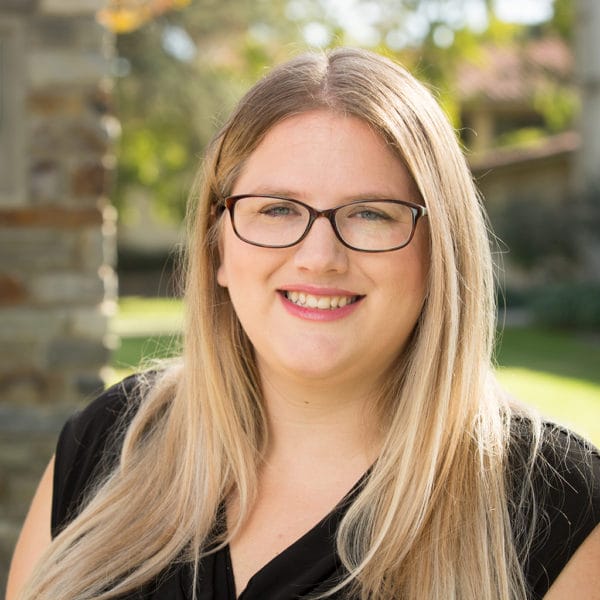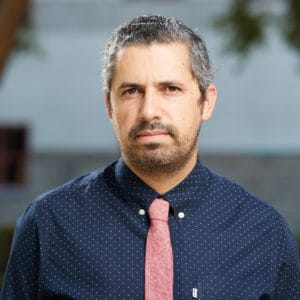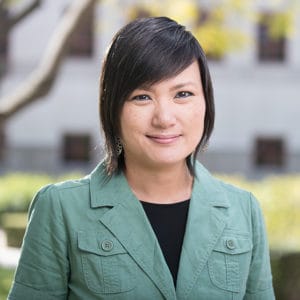Featured Students
-

Kerri Dean
History
in person
PhD in History
The PhD program in History enables you to conduct research at the highest level and begin your career as an academic historian or prepare for a wide range of academic and professional careers. You’ll work alongside CGU faculty-scholars who specialize in U.S. and European history and draw on expert faculty from the highly ranked Claremont Colleges as well. With abundant opportunities to traverse disciplines and bring diverse ideas together, you will engage in first-rate historical scholarship. The result: an in-depth education in history with a breadth of expertise and an instructional environment unmatched by most larger universities.
72 units
required units
PhD in History
degree awarded
In Person
modality
Spring, Fall
program start
4 years | full time*
estimated completion time
7 years | part time
estimated completion time
The American Studies concentration takes a multidisciplinary approach to the study of United States culture, society, civilization, and identity through the curricular lenses of history, literature, critical theory, and more.
The Early Modern Studies concentration undertakes interdisciplinary examination of history, culture, politics, and society within the transitional and transformative period that stretched between Medieval and modern societies, marked especially by the advent of print, Christian confessional war, and the rise of the modern state.
A comparative analysis of culture in the Americas, the concentration in Hemispheric & Transnational Studies explores how scholarship on the Atlantic, borderlands, and diaspora have reshaped U.S. American Studies, Caribbean Studies, and Latin American Studies, emphasizing the topics of empire, race, religion, and revolution.
Situated at the bustling intersection of cultural studies, new media, critical theory, and popular culture, the burgeoning field of Media Studies examines the creative and critical practices of media consumers, producers, artists, and scholars, focusing on questions of representation, power, technology, politics, and economy.
The Museum Studies concentration investigates the history and political role of museums in society, the interpretation and display of a wide variety of cultural productions, and topics of special concern to museums as cultural organizations, using a multidisciplinary, practice-based approach to understand the historical development of this evolving field.

Kerri Dean
History
Smith College
Fort Lewis College
CSU Channel Islands
Mount St. Mary's College
Claremont Colleges Libraries
U.S. Department of Commerce
Walla Walla University
The Drucker Institute
Azusa Pacific University

Associate Professor of Religion and History
Howard W. Hunter Chair of Mormon Studies
Research Interests
Mormonism, new religious movements, evangelicalism, religion and American politics

Professor of Cultural Studies and History
Chair, Cultural Studies Department
Research Interests
Modern Spain, 19th- and 20th-century Europe, Genocide and racial thought, Museums and commemoration, Memory

Assistant Professor of History
Research Interests
Citizenship, Migration, Sport, Public history, Digital humanities

Professor of History
John D. and Lillian Maguire Distinguished Professor in the Humanities
Chair, History Department
Research Interests
Colonialism and empire, unincorporated territories, migration and labor, comparative ethnic studies, Asian-American and Pacific Islander studies, 20th-century United States, indigenous issues, environmental history, oral history, U.S. expansionism
Claremont McKenna College
Research Interests
Late Antique history, Roman history
Scripps College
Research Interests
African diaspora with specialization in its literature
Harvey Mudd College
Research Interests
U.S. empire in Oceania with an emphasis on diaspora, labor, indigeneity, militarization, oral history and settler colonialism in Guåhan
Claremont McKenna College
Research Interests
20th century liberalism in the United States, Fair housing, Liberal religion and politics
Pomona College
Research Interests
Italian Renaissance art and architecture; Italian Baroque art and architecture; Medieval art history; history of cities, palaces, villas, and gardens; history of Genoa
Harvey Mudd College
Research Interests
Medical technologies, including x-rays, in the late 19th and early 20th centuries
Claremont McKenna College
Research Interests
Early American and Atlantic history; Race, family, and slavery in North America and the Caribbean
Claremont McKenna College
Research Interests
American Constitutionalism, American founding, Constitutional law, Military history, War and foreign relations
Pomona College
Research Interests
U.S. environmental policy, U.S. public-lands management, Western water politics, Immigration and border security, Urban politics and development, U.S. intellectual and cultural history
Pitzer College
Research Interests
Cultural and social history of early modern and modern Africa, Global diasporas, Gender and sexuality, West Africa, Slavery, Colonialism, Oral history
Claremont McKenna College
Research Interests
Design & architecture, East Asian history & political economy, Korean history, Modern Japanese history
Claremont McKenna College
Research Interests
American Constitutionalism, American Founding, Constitutional Law, Crime and Criminal Justice, Indian Gaming Issues, Redistricting, Supreme Court, Voting Rights
Pomona College
Research Interests
U.S. History, Alcohol and Drug Studies, History of Sexual/Gender Minorities, The Cold War, Labor Unions, International Labor Movements, U.S. and Britain, San Francisco Bay Area History, California History, Sustainable Development Policy
Courses
Up to 24 units transfer credit from previous graduate work in History may be substituted for the elective coursework requirements.
Research Tools Requirement
Research Papers
PhD Completion
Inaugurated in 1962, the Claremont Graduate University Oral History Program has amassed an impressive collection of interviews with persons whose life experiences merited preservation and special projects, such as China Missionaries Oral History Project, funded by the Henry Luce Foundation. It is a premier resource for research into the history of The Claremont Colleges and California state government and politics.
| Item | Description |
|---|---|
| Application Fee | $80 |
| Official Transcripts | Yes |
| Letters of Recommendation | 3 |
| Statement of Purpose | Yes |
| Resume | Yes |
| Academic Prerequisites | Master's degree required |
| Other Requirements | Writing sample, English proficiency exam |
CGU operates on a priority deadline cycle. Applicants are strongly encouraged to submit complete applications by the priority dates in order to assure maximum consideration for both admission and fellowships.
Once the priority deadlines have passed, the University will continue to review applications for qualified candidates on a competitive, space-available basis. The final deadlines listed are the last date the University can accept an application in order to allow sufficient time to complete the admissions, financial aid, and other enrollment processes.
Spring 2024
Priority Deadline – November 1, 2023
Final Deadline (International) – November 15, 2023
Final Deadline (Domestic) – December 1, 2023
Classes begin – January 16, 2024
Fall 2024
Priority Deadline – February 1, 2024
Final Deadline (International) – July 5, 2024
Final Deadline (Domestic) – August 1, 2024
Classes begin – August 26, 2024
The Claremont Graduate University online application is hosted online by Slate Technolutions via a secure web server. You will create a username and password so that you can return to continue your application over several sessions and check your status after submission. After you submit your application, it is made available for review by our faculty and staff.
The application fee is non-refundable.
Applicants must submit a sealed, official transcript from every undergraduate and graduate institution that has granted the applicant a degree. Electronic transcripts sent to admissions@cgu.edu are also accepted. For undergraduate coursework, applicants are required to submit proof of a completed bachelor’s degree from a regionally accredited college or university. Unofficial copies of transcripts are accepted for review purposes, but official copies will be required upon admission.
Applicants currently earning a degree that will be completed prior to attending CGU are required to submit a transcript showing work in progress for evaluation purposes. Once the degree has been granted, a final official transcript documenting the degree conferred must be submitted to CGU.
International applicants are advised to review the International Transcript Guidelines for additional information on submitting international transcripts.
Applicants must submit an up-to-date copy of their resume.
A valid score on one of the following examinations TOEFL, IELTS, Pearson PTE scores is required of all non-native English-speaking applicants. The examination is not required for the following applicants:
CGU’s school code for the TOEFL exam is 4053.
International applicants are encouraged to visit our International Applicants page for more information, including score requirements.
When filling out the online application, please enter references acquainted with your potential for success who will submit a written recommendation on your behalf. In most academic departments, references from faculty members who can speak to your academic ability are preferred; applicants with substantial work experience may request professional references. Please do not enter family members as references.
You will be required to input information for your recommenders (whether they are submitting online or not) in the “Recommendations” section of the online application. Please follow the directions in this section carefully before clicking on “Recommendation Provider List” to input the names and contact information for each recommender. You will have an opportunity to indicate if the reference writer will be submitting online. These reference writers will receive an email from CGU with instructions on submitting an online recommendation.
Recommenders who are indicated as offline will not receive an email from CGU with instructions to submit. These reference writers can submit via traditional mail and should use the supplemental New Student Recommendation Form. Recommenders can also email their letter of recommendation to the Office of Admissions at admissions@cgu.edu.
Please submit a 2-3 page statement of purpose that details your academic and/or professional achievements, your specific areas of research interest within your desired field of study, why you are a strong candidate for graduate studies at CGU, and your career goals.
All applicants are required to submit a writing sample of previous work in addition to the statement of purpose. You may submit samples of any length you feel indicate your writing ability, but please note that we will be unable to return any items submitted as part of your application (please, no books). Most applicants submit one or two scholarly papers or excerpts of around 10-15 pages. Writing samples should not exceed 30 pages.
| Program | 72 units |
| Tuition per unit* | $2,020 |
*Based on 2023-2024 tuition rates.
| $245 Student Fee |
| $150 Technology Fee |
| International Student Services Fee*: $661 fall semester, $776 spring semester **Applies to all international students (F-1 visa only) who are registered in coursework, doctoral study, or continuous registration. The fee is assessed each fall and spring semester for annual ISO accident and sickness plans and administrative fees. Subject to change. |
For estimates of room & board, books, etc., please download CGU’s Cost of Attendance 2022-2023 .
As a student in the School of Arts & Humanities, you have the option of completing one of five interdisciplinary concentrations.
The American Studies concentration takes a multidisciplinary approach to the study of United States culture, society, civilization, and identity through the curricular lenses of history, literature, critical theory, and more.
The Early Modern Studies concentration undertakes interdisciplinary examination of history, culture, politics, and society within the transitional and transformative period that stretched between Medieval and modern societies, marked especially by the advent of print, Christian confessional war, and the rise of the modern state.
A comparative analysis of culture in the Americas, the concentration in Hemispheric & Transnational Studies explores how scholarship on the Atlantic, borderlands, and diaspora have reshaped U.S. American Studies, Caribbean Studies, and Latin American Studies, emphasizing the topics of empire, race, religion, and revolution.
Situated at the bustling intersection of cultural studies, new media, critical theory, and popular culture, the burgeoning field of Media Studies examines the creative and critical practices of media consumers, producers, artists, and scholars, focusing on questions of representation, power, technology, politics, and economy.
The Museum Studies concentration investigates the history and political role of museums in society, the interpretation and display of a wide variety of cultural productions, and topics of special concern to museums as cultural organizations, using a multidisciplinary, practice-based approach to understand the historical development of this evolving field.
These concentrations are available for students pursuing the following degree programs:
Master’s Degrees
Doctoral Degrees